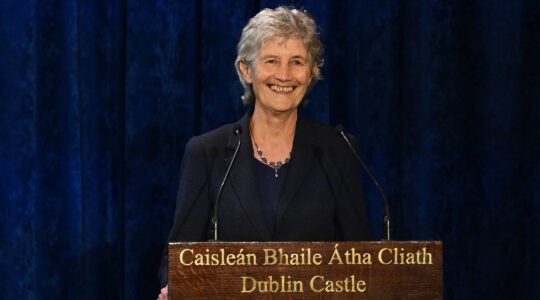MOSCOW (JTA) — Clutching the bars of the defendant’s cage, Ilya Farber assumed the posture of a crucifix as he proclaimed his innocence and pleaded for freedom with characteristic thespian flare.
“I implore the judge to rule in favor of the children,” the Moscow-born Jewish artist begged the court, having denied he took $13,000 in bribes from a contractor near the backwater village where he moved in 2010 to become a teacher and culture club director.
The Ostashkov District Court, however, found Farber guilty and hands down a seven-year prison sentence, as well as a fine of nearly $100,000. The guilty verdict on Aug. 1 was the second against Farber; the first was dismissed pending a retrial.
But instead of settling the case once and for all, the verdict has galvanized a protest campaign in support of the charismatic bohemian led by opposition activists, journalists, intellectuals and members of the Jewish community. And while not all agree on Farber’s innocence, they are united in viewing his trial as a symbol of injustice in a country with a government descending into disrepute, besieged by charges of corruption, discrimination and undemocratic practices.
As Russian corruption scandals go, the Farber case is fairly drab.
In 2010, the unemployed Farber took a job as a teacher in Moshenka, a tiny village of 200 souls midway between Moscow and St. Petersburg. He wowed some there and alienated others with his talent for opera, kung fu skills and fluent Chinese, not to mention his unorthodox teaching methods. Farber sometimes would teach in total darkness to help children overcome their fears, take his charges on environmentalist garbage-collecting trips and lecture to his classes while lying on a table.
In 2011, he was arrested for pocketing a kickback from Yuri Gorokhov, a building contractor who needed Farber’s signature to collect a government check for renovations he had performed at Moshenka’s humble culture club. Farber says he demanded the money as recompense for making up-front payments for repairs. Farber’s lawyer, Elena Romanova, says he plans to appeal.

Piter Farber, the son of Ilya Farber, standing outside the courtroom during his father’s trial in Tver, Russia, July 2013. (Piter Farber)
Yet the small-stakes affair has generated a media frenzy that many credit with a decision this month by the Kremlin’s human rights watchdog to review the Farber case. Moshenka, which had received only a rare mention even in the district weekly, has seen dozens of journalists fill the bleachers for Farber court appearances. Front-page articles have appeared in Novaya Gazeta, among other papers, and two television channels already have produced specials about the case.
“To many, Farber’s harsh sentence merely underlines the impunity enjoyed by others who are much more corrupt and more powerful than himself, and who even use the judiciary to frame and knock out competitors or critics,” said Michael Edelstein, a lecturer at Moscow State University and a writer for the monthly magazine L’chaim.
Opposition leaders have seized on the Farber case as evidence of the corruption endemic to the regime of Russian President Vladimir Putin. At a rally in Moscow earlier this month, political activist and prominent Putin critic Alexei Navalny compared Farber’s treatment with that of Yevgeniya Vasileva, who is suspected of embezzling $11 million from the defense ministry subsidiary while having an affair with Anatoly Serdyukov, then defense minister and now a suspect in a separate corruption case.
Navalny noted that as Farber was preparing his defense from the prison cell he has occupied since 2011, Vasileva was photographed at a Moscow mall during her daily three-hour break from house arrest.
But Farber is not only backed by opposition figures. Also in his corner is Yuri Kanner, the president of the Russian Jewish Congress, which has tried, like many Russian Jewish groups, to remain neutral through the years of polarizing struggle between Putin and his critics. The congress has collected more than $30,000 in donations to cover Farber’s legal expenses and support his three children, according to Matvey Chlenov, the group’s deputy executive director.
“We decided to start helping Farber because we believe that anti-Semitism was present and played a role in the early stages of his prosecution,” Kanner said.
The anti-Semitic element surfaced early in Farber’s trial when prosecutor Pavel Vereshchagin reportedly asked the jury, “How could a man named Farber voluntarily help villagers?”
Vereshchagin, who has since been made a judge, denies making the comment, which was widely interpreted as a reference to Farber’s Jewish origins. Yet many believe it helped convince the Supreme Court of the Russian Federation to grant Farber a retrial in 2012. The court did not mention Vereshchagin, but cited other “irregularities,” including the judge’s instruction to the jury “not to listen” to Farber.
Dmitry Bykov, one of Russia’s leading journalists, penned a fiery piece in the Sobesednik weekly this month in which he likened Farber’s trial to two of the most infamous miscarriages of justice against Jews in modern European history: the trials of Menahem Mendel Beilis in Kiev and Alfred Dreyfus in Paris.
“All three were Jews who invoked fierce hatred in certain parts of society,” Bykov wrote. “All three processes are divisive and accompanied by a media storm around unjustifiably harsh sentences, with appeals retrials and backroom rumors.”
For his part, Farber’s eldest son, Piter, 19, does not credit the opposition or any anti-xenophobic backlash with the intense interest that Russians have taken in the case.
“People care about Ilya’s case because they think that if an artist who never broke the law could be convicted in Russia, then so could anyone,” Piter said. “Especially if they’re a bit different.”
JTA has documented Jewish history in real-time for over a century. Keep our journalism strong by joining us in supporting independent, award-winning reporting.






